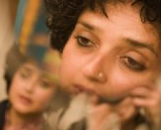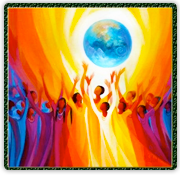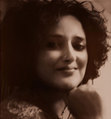Mira Prabhu's Blog, page 87
June 6, 2014
The Ego Is Not Your Amigo – Part 1 of 2
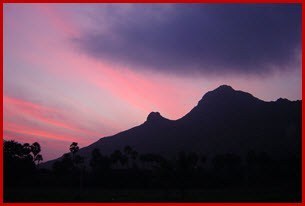
Arunachala
One twilit Sunday evening, a friend and I embarked on the 14-kilometre Giripradakshina trek. In this specific case, Giripradakshina refers to the ancient practice of circumambulating the sacred hill Arunachala—which rises majestic from the center of the intriguing ancient temple town of Tiruvannamalai in Tamil Nadu, south India.
Taking off from Ramana Ashram, we made our way through a segment of crazy busy highway until we reached the serpentine tree-shaded mountain path (Girivalam) road populated with varying types of sadhu—from the often belligerent itinerant hoping to escape a tricky mundane situation by donning the orange robe that bestows instant spiritual status and garners support from many quarters—to the true renunciate of radiant countenance.
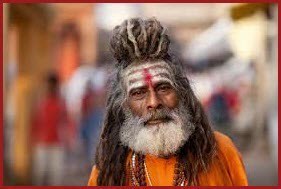
Portrait of a Sadhu
Some sadhus beg voraciously, others meditate or read spiritual texts, while still others engage in various forms of simple work. My favorite sadhu sits beneath a hoary tree near the entrance to Niruddhi Lingam. Seated cross-legged on the bare ground, armed with scissors, needles and thread, he patiently fashions gorgeous bags out of bits and pieces of donated material for his fellow sadhus. A smile of great sweetness illuminates his aged face—this despite being burdened with a bum leg that clearly causes him pain, and the hard fact that he has chosen to survive almost solely on the bounty of mountain lovers. (He told me he’d started out as a family man with a career in watch/clock repair; unable to meet the nagging material demands of his wife, he’d returned her to the bosom of her prosperous family, and moved to Tiruvannamalai as a renunciate.)
Still other sadhus offer us dazed looks that hint at the use of ganja or booze. (One fragile old chap with the demeanor of a saint begged me for money to buy his asthma medication, which I forked over. Next day, while walking my dogs, his fellow sadhus chided me—apparently the wily old chap had run directly to the gadang (country liquor shop) and had imbibed so copiously he’d landed up in the local hospital!) Just to remind you, though—there are myriad jewels among this community of ascetics who abide in the shadow of the great hill—and many do make good use of our help.
Seven kilometers or so down the road, my friend and I re-entered the bustling town. Vehicles hurtled towards us from all sides like meteors—only not so pretty—motor bikes, cyclists, cars, trucks, lorries and gas-hungry SUVs that usurped the road, often at reckless speed. Hungry, and tired from the long walk, we decided to break for dinner at Ramakrishna Hotel.
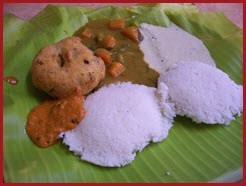
South Indian Idli Vadai
My friend ordered idlis (steamed rice/lentil cakes accompanied by a vadai (a fried rice/lentil cake) flavorful coconut, tomato and mint chutney as well as the ubiquitous sambhar—lentil/vegetable gravy). Craving something other than the usual south Indian cuisine, I bravely ordered the chef’s version of Szechuan noodles—a mound of well-flavored noodles garnished with—believe it or not!—bits of fresh fruit! Fortunately I was not disappointed, for the crunch of tart-sweet pomegranate, crisp apple, and crimson preserved cherries made the dish bizarrely yummy.
As we were paying the bill, two young men strolled into the restaurant and sat at the corner table diagonally opposite us. I read the caption on the first one’s tee-shirt: Your Ego is Not Your Amigo—and burst out laughing—most certainly there are no accidents! You see, the major reason seekers on the path of jnana (eastern metaphysical wisdom) circumambulate Arunachala is to beseech Shiva to burn their ego to ashes—so they can experience the bliss of their true nature, the luminous Self.
Now here was one more saucy reminder that the ego is not my true friend—simply because it cares for nothing beyond the gratification and glorification of mini-me. Venturing beyond the relative frightens the ego—for once body and mind are seen to be ephemeral, and once the immortal blissful Self begins to reveal itself within our own human hearts, it is inevitable that this false sense of self must die.
And yet the ego is the most cunning warrior you will ever encounter: seeking to preserve itself by any means necessary, it leads the incorrigible egotist into endless suffering—which is why the acronym for EGO that I first heard so long ago in the 12-Step rooms of Manhattan: Easing God Out—continues to make such perfect sense to me. Why is this? Because the ego, backed as it is by the smoke-and-mirrors tactics employed by the cosmic enchantress Maya, has the power to delude us into believing that we are no more than body, mind, emotions—and thereby blinds us to the truth of who we really are—which, according to eastern mystics, is no less than the Divine/Absolute in temporary human form—no less than Sat-Chit-Ananda (pure existence-pure consciousness and pure bliss).
Follow Blog via Email
Enter your email address to follow this blog and receive notifications of new posts by email.
Click the buttons below to SHARE if you liked this post.


May 31, 2014
Kev’s Author Interviews Presents: Mira Prabhu!
The Fire Goddess Kundalini links souls all over the cosmos — which is how I got to meet Kev Cooper over the internet…here is the interview he posted on my work and life — blessings from blistering Arunachala!
 Originally posted on Kev's Blog:
Originally posted on Kev's Blog:
When Mira came to me asking about Kev’s Author Interviews I couldn’t resist saying yes to something totally fresh. Be prepared to indulge yourself with some Ancient Eastern Philosophy and Mythology folks as you meet the goddesses and gods of India in search of your own complete, inner circle. (See, I do read! )
At the same time, on a more serious note, venture with Mira as she shares her own struggles for freedom from the oppression of India’s traditional approach towards women. You’re in for one hell of a ride!
Presents: Mira Prabhu
Background:
I was born in Bangalore, a city located in the deep south of India which made its début on the world screen a few decades ago on account of an insane eruption of hi-tech companies; as an unfortunate consequence of this frenetic industrial growth, Bangalore today bears no resemblance to the spacious…
View original 6,110 more words


May 7, 2014
Myndless Imagining & Cosmic Love….
Adithya Raghunathan is a spirited dancer based in San Francisco who breaks through a multitude of invisible veils. An intrepid explorer into spirit and mind, Adithya is also a burgeoning healer whose biggest gift is his presence—which he offers through the acts of listening, gazing, touching, and dancing. He enjoys helping people find meaning behind pain, connect with intuition, and find inspiration to grow into the perfect beings we all are in essence. He speaks fluent facebook and broken twitter and loves to connect with the human race in all its amazing diversity. Here is something he wrote on his blog. Since it concerns a subject that has engrossed me for most of my own life, the giant leap from finite to infinite love, I thought to share it with you:
COSMIC LOVE
They say you can’t really love someone else until you learn to love yourself.
We read self-help books, we go to therapy, we dance, and we learn to accept our self. One fine day, we can tolerate a little alone time, giggle at our neuroses, and wonder, “Hey, maybe I can love myself now!” We give a nickel to a bum on the street. Surprised with our own generosity, we think, “Hey, maybe I can love the world too!” At a safe distance, we love him generously, and we feel even better about ourselves. Loving other, we feel accomplished, as if we are finishing the long road to self-love. And then along comes a lover. We love beautifully, perfectly, and then, all of a sudden, our lover gets too close. Our fantasy crumbles. Lover painfully shows us the last frontier of things not yet loved, the dumping ground for orphaned parts of self.
The lover is close enough to identify with, and this intense identification begets love. But the lover is also far enough away to safely project all the remaining skeletons in our closet. Sometimes, we treat the lover like the bum, a recipient of our idealizations, safely loved at a distance. But when this same lover comes close, identification can make the darkness unbearable. We reject in the lover what we can’t bear to see in ourselves. Lover becomes the victim of our most desperate fears. Taking on our deepest unresolved work, lover becomes our favorite whipping boy. Our neuroses flee safely outwards, cast into dialogue, cemented into nagging or complaints. Projecting inner dissension outwards, we avoid the fire inside.
Learning to Heal
We are presented with an incredible opportunity to learn. But in this tender space of inflamed self, learning is painful. Instead, we are tempted to “take space” or break up or cheat. We might even feel empowered by proclaiming indifference or playing hard to get. We say to ourselves, “I didn’t like you that much anyway” or out loud, “I don’t think it’s going to work out.” We create the familiar samsaric yo-yo of human relationship, pathologizing our “fear of intimacy” so we can feign helplessness.
Real power does not come from indifference or distance. It comes from a faith that everything will be alright. A courage to continually surrender and enter the crucible of learning. A belief that if we fall on our face, the earth mother will pick us up again. A belief that the universe supports us.
When we enter love, we enter a solemn healing relationship, not bound in space and time. We remain psychically bound, our memories and bodies holding the other, even if we decide never to see each other again. As lovers, we invoke demons, and inspire angels. We stir up trauma, we catalyze learning, we provoke healing. We cannot help but hold our lover’s karma, flowing through our hands like wisps of hair in the throes of passion. But how do we square the boundless nature of love with advice to “establish healthy boundaries”?
Psychobabble
Psychologists coach us to figure out “what’s mine” and “what’s yours” and thereby avoid dealing with “the other person’s shit”. We are asked to “own” something or ask our love to “own up” to something. We learn to have discussions about “having our needs met”. Clearly this advice is a useful intermediate step towards contact, safety, and integrity. Instead of getting lost in another person’s psyche, we focus energy on our own familiar problems. Through repetition, we start to see ourselves better, we see others better, and in seeing there is acceptance. But as we get bigger, more capacious, we must expect more of ourselves. We must recognize the larger web of interconnectedness we inhabit. I believe that the spiritual call to love is quite different than the psychological one.
We are called to hold on to the darkest things we see in our love. In this acute darkness, we find the discarded parts of self we separated from and projected onto bums. We find the disgusting parts of the world we could not accept. Holding on to the dark doesn’t mean we disqualify our needs, or hold on to a physical relationship at all costs. It doesn’t even mean that we try to ‘help’ our lover, as that can be counterproductive or even misguided. It means that we cease to differentiate, categorize, label, and assign. Our inner psychologist complains, “But this is NOT me!” But on a closer look, maybe it is us. An orphaned desire, a repressed shadow, or a part of humankind that desperately needs our compassion. Keeping our hearts stubbornly open, we recognize that we are all traveling together and our destiny is shared. We reach the finish line together. We hold onto the dark in ourselves, our lovers, our world, so that we can play ourselves awake.
New Love
In cosmic love, we say to our lover, for the first time ever, “I believe in you.” Our belief is strong, because we are suddenly holding everything in our relationship, without conditions. Fiercely holding our lover’s delicate present and wildest potential, we are forced to release expectations, knowing they derive not from our lover, but our own life experience. We thereby recognize disappointment of expectation as our own.
Disappointment is a signal for us to take care of ourselves, to mourn with great intensity, with the single-minded goal of returning cleansed. We aim to say again to our lover, without hesitation, “I believe in you.”
In cosmic love, we speak dangerous words like these, “There is nothing I need from you, nothing in particular I desire, except your everything. I affirm that there is a love beyond expectation, a love beyond possession. I will wait lifetimes, if need be, for your flower to bloom. Until then, our love mingles in the earth and the stars.”
New Self
In cosmic love, we find in thefearless space of no expectation an unflinching love of ourselves, our lovers, and our world. We dissolve the distance once inserted between these kinds of love, finding that there is only one kind of love, one kind of lover, indeed, one kind of Self. We “respond to the joys and sorrows of others as if they were our own … attaining the highest state of spiritual union” (6:32 Bhagavad Gita). Each love, each lover, gives us a chance to knit our Self together, to beat a path back towards a universal human compassion. Once united, we can never again be torn apart.
Write to Adithya via his blog: http://eudae.blogspot.in/. He would love to hear from you!
And of course, you can leave comments on this blog too — FOLLOW me if you would like to get regular updates of new posts…greetings from Arunachala!


May 5, 2014
Do You Want To Fly?
Manhattan January 1993: A friend offers to pay for a Vedic Astrological reading with James Kelleher, an American who studied with great teachers in India and returned to the west to share his amazing gifts of illumination.
I don’t believe in this outdated crap, I say to him, stubborn as ever—how the hell can a complete stranger possibly help me? But my friend insists—he cannot stand to see me continuing to reel, both emotionally and financially, without a clue about what I should do—at the time I was on the verge of losing considerable financial assets due to a pending divorce.
Believe it or not, Kelleher’s compassionate reading that freezing morning in Manhattan did save my life. He warned me that what was to come would test my emotional mettle to breaking point—and assured me that if I did make it through that hellish year, I would enter a period of progressive prosperity, creativity and renewed zest for life. It was listening to his calm voice on the audio tape he handed me after his reading that pulled me through that darkest of times. Why did I have such faith in him? Because his other predictions had rung so true.
Another thing Kelleher said was that the novel dominating my consciousness at the time—and please note he did not even know I was a writer—we were strangers, he from Los Gatos, California, I from Manhattan via south India—would be a success—but only after decades of struggle. He urged me to finish it no matter the obstacles because it was my dharma to do so so. And true enough, writing Whip of the Wild God, which took me twenty years to complete to my satisfaction, was indeed my dharma, for, as it took shape, it refined my own jagged persona.
Early this morning, I read Kelleher’s newsletter and enjoyed his offering:
Do you want to Fly?
Reprinted from: Path of Light by James Kelleher
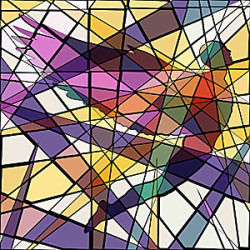 India constantly draws me back. On one occasion, while visiting Delhi, I had a flying dream. Okay, I admit it, I’m a flapper. I know it’s common for people to fly in their dreams, but I have a recurring flying dream in which I begin to float. The floating goes along with an inner realization that I have the ability to fly, which leads me to start flapping my arms. I don’t soar through the air like other people, however, directing every movement like some astral jet-pilot. Instead, I flap, float a little, and then flap some more. Pitiful, isn’t it? On this particular night, I was flapping and floating, and apparently quite pleased with my progress, because I was also repeating to myself, “I’m getting lighter and lighter and lighter, I’m getting lighter and lighter and lighter!”
India constantly draws me back. On one occasion, while visiting Delhi, I had a flying dream. Okay, I admit it, I’m a flapper. I know it’s common for people to fly in their dreams, but I have a recurring flying dream in which I begin to float. The floating goes along with an inner realization that I have the ability to fly, which leads me to start flapping my arms. I don’t soar through the air like other people, however, directing every movement like some astral jet-pilot. Instead, I flap, float a little, and then flap some more. Pitiful, isn’t it? On this particular night, I was flapping and floating, and apparently quite pleased with my progress, because I was also repeating to myself, “I’m getting lighter and lighter and lighter, I’m getting lighter and lighter and lighter!”
The next morning I woke up feeling refreshed and energized. Flying dreams always leave me with an expansive feeling that I can do anything.
I had heard through the grapevine that Hans Baba was in Delhi. I had met Hans Baba the previous year for the first time. At that time I was suffering from a bad case of food poisoning. Hans Baba had me stand under his hut while he put his foot over the side of his porch, resting it on my head. He then channeled energy through his foot, telling me that I would begin to feel warm. It was January, and Delhi was cold. I was wearing a down parka. After 2 minutes of standing under Hans Baba’s foot, however, I began to feel very hot and started sweating profusely. I took off my parka and sweater, and stood there in my T-shirt feeling like I was burning up. The whole time, Hans Baba was laughing. He finally said ” Go now, you will feel better”. I did feel better. In fact, I felt great for the rest of the month-long trip in India.
On this occasion, however, I had no health problems for Hans Baba to cure. In fact, I was just going to say hello and to receive darshan. As I entered the compound, I could see his manch (the hut on stilts) from a distance. I could see Hans Baba sitting there singing to himself. I was in luck. There was no one else there. I walked up and stood in front of the manch. Hans Baba’s smiling eyes looked down at me. His eyes danced and twinkled like the eyes of some great cosmic prankster, “Do you want to fly?” he asked. I paused, “What is he talking about?”, I thought. “Uhhh…”I said, a little confused. “Do you want to fl?y?” he asked again, laughing. “What the heck!” I thought to myself, and then blurted out, “Yes! I’d like to fly!” For the second time I found myself standing beneath Hans Baba’s manch, with his foot on my head. I was remembering the miraculous healing that he gave me the previous year, thinking, “What now? Is he going to levitate me into the air in front of his hut?” I could feel the energy coming through his foot, through my crown chakra, down through my neck and spine, and down to my feet. It felt exhilarating. “I’m ready for anything!” I was thinking. Then, out of the blue, Hans Baba began saying, “Are you getting lighter and lighter and lighter? Are you getting lighter and lighter and lighter and lighter?”. He laughed and continued to channel energy, repeating the exact words from my previous nights dream to me for the next 15 minutes.
The next day, Dr. Dinesh Sharma and I caught a flight to Udaipur. As I looked out the window of the plane, I noticed how barren this part of India looked from the air. “Looks can be deceiving,” I thought, as I reflected on the previous days meeting with Hans Baba. India is a country of stark contrast, incredible poverty, side by side with incredible wisdom, the most barren deserts and the highest mountains in the world, all in one country. I was thinking about the experience of standing under his foot, and how he asked me if I wanted to fly. “But I didn’t actually fly. Well, never mind.” I thought, ” It was a great experience anyway, and besides, he seemed to know the contents of my dream!”
Whenever I travel to India, I always visit any good astrologer I hear about. Over the years this has taken me into remote villages, big cities and various nooks and crannies throughout India. In the process, I have experienced a variety of different types of astrology and other divination systems. Just as each area of India has its own cuisine, so too, each area has its own unique style of Jyotish. My trip to Udaipur was for the purpose of getting a Brighu reading. Brighu astrology is a unique style of astrology which works in the following way. Thousands of years ago, there was a lineage of great jyotishis who were followers of a great sage named Brighu. These astrologers wrote down the horoscopes of hundreds of thousands of people. But the horoscopes they calculated were not the charts of people of their own time, but rather people from the future. The Brighus also interpreted these charts giving great detail about the lives of the people who owned the horoscopes. These charts were kept in families, passed down through the centuries. The idea is that you go to visit a brighu astrologer, he looks up your chart, and reads to you what the ancient jyotishis predicted about you.
Good Brighu astrologers are not easy to find in India. There are, understandably, many charlatans. But the recommendation for this particular Brighu astrologer had come from a reliable source and I was very curious to finally meet someone who actually practiced this ancient form of jyotish. At the airport in Udaipur we hired a taxi and set out for Karoi, a small village, three hours outside of Udaipur on the Jaipur-Udaipur road. The road to Karoi is not particularly beautiful, but it does have character. It is a mix of rolling hills covered with scrubby-looking trees. We passed through small villages along the way and stopped at one so the driver could get some tea.
When we finally arrived at the Brighu astrologer’s place, he already had a line of people waiting at this door. His place was a simple adobe-like house, with a side room for an office. The pundit used to sit there each day and see clients on a first come, first serve basis; no appointments. The pundit was busy with some clients when we arrived so we sat outside with the villagers and waited for a couple of hours for our turn.
The reading itself started in a very unique way. The pundit spoke Hindi, and although I speak Hindi, I am not fluent, so Dinesh translated. The pundit asked to see my horoscope. I gave him my chart. “Show me your palms.” he said. Even though I had come for an astrology reading, it did not surprise me that he had asked to see my palms. In India it is very common for astrology and palmistry to be practiced together. What did surprise me, however, was the way he used the palms to verify the horoscope. He did not read my palms as a means of prediction. Instead, as he looked at my palms, he busily wrote with a piece of chalk on a small blackboard on his lap. He filled one side of the black board with different numbers. Then he wrote something on the other side. After examining my palms, he showed me the side with the numbers and said, “Point to a number.” I pointed to 55. Then the pundit turned over the black board where he had already written, “he will point to 55″. Apparently, I had passed the test. He accepted the chart I had brought as the correct chart.
Next the pundit used a dial of some sort to locate my chart, apparently keying on planetary positions in the chart I had brought. He then went to one of the many trunks that surrounded him on the floor and started searching for the Brighu version of my chart. Finally, he came up with a chart, and matched the positions on the chart with those on the chart I had brought. Dinesh also got in on this process, verifying for me that the two charts were the same. Both of us satisfied that he had chosen the correct chart, the pundit began his reading.
“Your chart is one in a million!” he exclaimed. “Right.”, I thought cynically, “Every person’s chart is one in a million!” I had a sinking feeling, as if all of the time, effort and money I had already spent on this trip was about to be wasted. He went on, “You are an astrologer and you also read palms.” My ears perked up. “Okay, I’m listening.” I thought. He went on. “On the day you came here, it is a Tuesday, and you came with one other man. Your father is dead. Your mother is sick. You have 3 brothers and two sisters…etc., etc.” He continued like this for about a half an hour giving intricate details of my life which were all extremely accurate, and making predictions on my future, many of which have already come true. I was really amazed. And then, amidst all of the details, he said, “At the age of 48 you will purchase an airplane!” My immediate reaction was, “Okay, he’s allowed one mistake.” An airplane is an extravagance, which would be too great a stretch for my frugal nature. It was an obvious mistake, but he was batting 99 per cent and I was very impressed.
On the drive back to Udaipur, as I looked out the car window at the scruffy looking hills, I reflected on the pundits reading. “India is a place of mysteries.” I thought. First Hans Baba, now the Brighu pundit. How an astrologer from ancient times could calculate and interpret my chart, giving the accurate detail of my life, a life taking place many centuries after his time, is a great mystery. I was filled with wonder. In fact, it didn’t even matter to me whether any of his predictions came true, much less the one about the airplane. The mere fact that some ancient astrologer had described my life so accurately simply inspired a great sense of wonder. As a practicing jyotishi, I am used to having clients go away with a sense of wonder. It is one of the great side-effects of getting a good astrology reading. It reminds you of the divine mystery of life. But after doing thousands of readings, I am used to how mainstream Jyotish works, so it no longer seems mysterious to me. It just seems beautiful and natural when something that I say in a reading for a client actually comes true. Mainstream astrology has become like a close friend who I know intimately and love dearly. It is part of daily life, part of my family. The Brighu reading, however, seemed a little mysterious and made me wonder. And I was grateful for that feeling.
One last thing. A couple of years later, a number of events led my wife and I to buy a house in Nevada City, in the foothills of the Sierra Mountains, in Northern California. We also have a residence in Los Gatos, and for the time being, we were intending to maintain our offices in the San Jose area and to commute to Nevada City on the weekends. We wanted to retire there eventually. In the mean time, we were faced with a 3-hour commute, once a week, which on a Friday afternoon can turn into a 6-hour commute. Without even thinking about the Brighu reading, I got a wild idea. Why not learn to fly and buy a plane? I researched the idea and it seemed a practical solution to our commuting problem. I immediately started taking flying lessons, intending to get my license and plane at age 47. The process got delayed when my flight instructor was unexpectedly fired, setting back my training by several months. I finally got my private pilot’s license a year later and, two weeks before my 48th birthday, I purchased an airplane. The pundit’s words came back to me. Amazingly, however, so did Hans Baba’s, “Do you want to fly?” Now, I am getting “lighter and lighter and lighter”, but the only flapping I do is when I put down the flaps on the plane as I make my final approach for a landing!
Note: You can subscribe to James Kelleher’s Newsletter by contacting him at: james@jameskelleher.com


April 15, 2014
Sometimes a Wild God
Poignant mystical poem by Tom Hirons…here’s a taste…
The wild god reaches into a bag
Made of moles and nightingale-skin.
He pulls out a two-reeded pipe,
Raises an eyebrow
And all the birds begin to sing.
I saw this at dawn this morning, loved it, and thought, wow, he’s writing about Rudra-Shiva too! Just as I did with Whip of the Wild God: A Novel of Tantra in Ancient India — only he hints at Pan, wild wonderful paradoxical Pan…and to me these ancient archetypal divinities are all the same thing….of the same essence….and that essence is the mysterious underpinning of our own soul/s….anyway, enough gushing….would love to know how YOU react to Tom’s gorgeous outpouring….
 Originally posted on Coyopa :: lightning in the blood:
Originally posted on Coyopa :: lightning in the blood:
Sometimes a wild god comes to the table.
He is awkward and does not know the ways
Of porcelain, of fork and mustard and silver.
His voice makes vinegar from wine.
View original 633 more words


April 2, 2014
Tantric “Sluts” or Living Goddesses: Why it Matters
Greetings from Arunachala!
As many of you must know by now, the inspiration for my novel — Whip of the Wild God: A Novel of Tantra in Ancient India – partly drew from my growing awareness that what I was studying of Tantra — in its pure form — as a means of exploding consciousness, from finite to infinite, with techniques open to both celibates as well as to couples – had degenerated into a circus that does a terrible disservice to the initial purity and power of this ancient philosophy of liberation. And the beat goes on — I still meet people who flinch at the very mention of Tantra/Tantriks/Tantrikas — so here is a blog post you might like to read…and comment upon.
 Originally posted on body divine yoga:
Originally posted on body divine yoga:
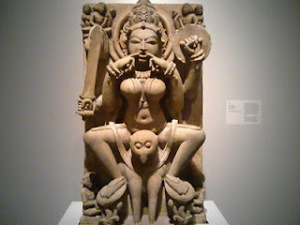
With recent media revelations about ritual sex, nude yoga and “yogasms” – sex has become a hot topic in the yoga world. Well, in honour of Women’s History Month, I’m joining the fray. Because let’s face it, nothing is more juicy or salacious than the forgotten high priestesses of sex, the “debauched” yoginis of Tantra.
While much conventional scholarship has designated these women as low-caste “sluts” exploited for ritual purposes, religious scholar Miranda Shaw has unearthed a very different history. Her book Passionate Enlightenment: Women in Tantric Buddhism claims these women were no mere ‘consorts’ but powerful gurus once held “in awe, reverence and obeisance”.
Her book is a biographic treasure trove of Tantric women teachers spanning the Pala Period of India (8th -13th centuries). According to Shaw, their writings and teachings were pivotal to the “central feature of one of most brilliant flowerings of Indian civilization”. So why are their…
View original 1,068 more words


March 8, 2014
Writing—So Easy a Caveman Can Do It
Greetings Fabulous Folk! I am re-blogging Kristen’s post on aspects of the writing life so you can set those wheels in your own bright heads turning….I took 20 years to complete my first novel, Whip of the Wild God — in actual time, perhaps 4 years — it also went through about 7 incarnations — and I can honestly say from personal experience that writing is rewriting — i can spend hours polishing a single paragraph — not at one stretch, but over the span of writing the book — or finding the perfect word to describe what i want to convey…everyone wants to be a writer today, but few know how difficult it is to stay the course…writing takes more than talent — it takes perseverance, meticulous attention to theme, character, dialogue, plot — most of all, when it comes to a novel, it takes being so passionately in love with your subject/s etcetera that you are willing to keep going and going…until you have a piece of art that truly works…if you are a serious writer, you KNOW what I mean….
 Originally posted on Kristen Lamb's Blog:
Originally posted on Kristen Lamb's Blog:

Original image via Flickr Creative Commons courtesy of Sodanie Chea
Recently a Facebook friend shared a post with me regarding Indie Musicians versus Indie Authors. It appears our culture has a fascination and reverence for the Indie Musician whereas Indie Authors face an immediate stigma. We authors have to continually prove ourselves, whereas musicians don’t (at least not in the same way). My friend seemed perplexed, but to me it’s very simple.
We’re not even going to address the flood of “bad” books. Many writers rush to publish before they’re ready, don’t secure proper editing, etc. But I feel the issue is deeper and it reflects one of the many challenges authors face and always will.


March 3, 2014
Monday Funnies
Love that beautiful old bird with the amazing wit…amazing what a good laugh can do for the Spirit…
 Originally posted on Chris The Story Reading Ape's New (to me) Authors Blog:
Originally posted on Chris The Story Reading Ape's New (to me) Authors Blog:
About Cooking!

Ever feel confused?



February 27, 2014
Zora Neale Hurston’s Politics Might Surprise You
Robert says: From the little reading I’ve done by and about (Zora Neale) Hurston, it seems she was very passionate about individual pride and personal responsibility, over cultural pride and “groupthink.” I love this quality in a person! As a proud Indian who now lives in an India where millions are stuck in the rut of cultural pride and groupthink — without using their minds like rapiers to challenge and toss out what we no longer need, what no longer serves our liberation as individuals and as a people…I wish we could breed a million Zoras….just to shake us all up and make us think again — as our brilliant ancestors did!!! So….what do you think, huh?
 Originally posted on 101 Books:
Originally posted on 101 Books:
I try to avoid politics on this blog. As a general rule, I despise politics and all that comes with it.
But when an author has unique political views, sometimes I step into the shallow end of the pool a little. That’s the case today with Zora Neale Hurston.
She was a Republican. Granted, being a Republican in the 1950s is different than being a Republican in 2014. But, still, her views were certainly unique in her culture during that time.
John McWhorter is a professor at Columbia University, and he’s called Hurston “America’s favorite black conservative.” Other academics have said she was more in line with a Libertarian. Either way, she wasn’t a Democrat—which generally gets about 90% of the African-American vote, according to The National Review.


February 22, 2014
What Does It Mean To Be “Well Read?”
Robert brings up an interesting point — do you consider yourself well-read? This is such a crazy question for me…and I speak as an Indian educated in the so-called British system. We are given to understand that well-read means reading the western world’s best fiction, non-fiction and of course the classics — but this is all just brainwashing… today i realize I have no need to be “well-read” other than as a social lubricant — so I can make intelligent-sounding small talk or look good in the eyes of others….it is all a mountain of trivia — unless the process of educating myself has led also to the cultivation of wisdom and compassion….what do you think?
 Originally posted on 101 Books:
Originally posted on 101 Books:
Someone recently told me I was “well read,” which I find interesting. The whole reason I started 101 Books was because
I felt like I wasn’t “well read” enough
, whatever that means.
So now that I’ve read nearly 70 books in four years, am I well read all of the sudden?
Seriously? That’s all it takes–70 books in four years?




